Fake love avoids home-buying rules
Updated: 2013-07-19 07:06
By Hou Liqiang (China Daily)
|
||||||||
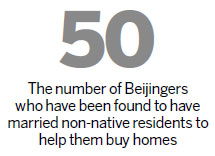
The recent crackdown on real estate agencies helping non-native Beijing residents create bogus marriages with local Beijingers in order to buy property has law experts divided on the legality of the ploy.
The capital's housing and urban-rural development commission is accusing Golden Time Real Estate and Jinziyan Real Estate of aiding in the arrangement of 17 sham marriages. Officials said they are investigating eight home purchases.
Bogus marriages between non-native residents of the capital and Beijingers began cropping up after the city government issued a provision in 2011 permitting non-native residents only one home purchase, and that only if they had previously paid social security or income taxes for five consecutive years.
But the provision has a glaring loophole: Non-native residents can buy two homes if they marry a Beijinger.
Single Beijing locals are qualified to buy one home. A Beijing couple - with at least one having Beijing hukou -can purchase two.
According to the capital's housing and urban-rural development commission, locals are paid by a non-native resident or an agency to create the bogus marriage. After the property is purchased, they divorce.
The commission said 50 native residents have been found to have married non-native residents for the purpose of buying a home. One woman, it said, got divorced three times within five months.
Li Junfu, an associate professor and deputy director of the sociology department at Beijing University of Technology, said non-native residents made up a third of all homebuyers before the 2011 provision, but account for only 10 percent of home purchases thereafter.
"The need (to buy a home in Beijing) is there, so many people have no choice but to run the risk. And the provision creates an opportunity for Beijingers to make a profit without doing much at all," Li said.
Officials receive an alert if a person's identity card number shows up in the commission's home-buying application system three times.
Zhang Kai, who works at a real estate agency, said he has heard of the secretive trend, but added that agencies cannot help arrange marriages.
"There is an industry that focuses on helping people become qualified to buy homes," he said. "They have very good relationships with officials in the civil affairs bureau responsible for issuing marriage licenses. These agencies work with these officials to make sure the marriages are legitimate but are not archived or recorded."
Wang Xing, an attorney at Beijing Huicheng Law Firm, said exploiting the provision's loophole is not illegal. The problem, Wang said, is the policy itself.
But Liu Honghui at Yingke Law Firm said the bogus marriages are against the spirit of China's marriage laws.
"The law states that you cannot do that, but there is no penalty for it," Liu said.
What the government can do, Liu said, is to blacklist those who have had sham marriages and nullify their qualifications for buying a home.
It can also be a very risky move for non-native residents to agree to a bogus marriage.
"Local residents involved in the marriage may ask to divide up possessions at any time after the house is bought," said Liu, adding that courts could deny a divorce filing if a proper reason isn't provided.
houliqiang@chinadaily.com.cn
(China Daily USA 07/19/2013 page4)
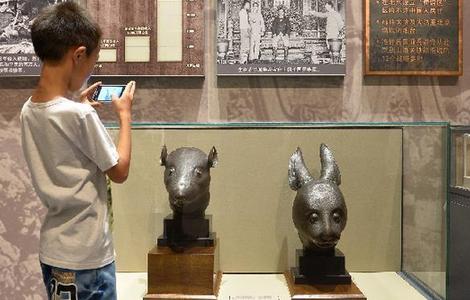
 Rat, rabbit head sculptures on display
Rat, rabbit head sculptures on display
 Russia jails opposition leader
Russia jails opposition leader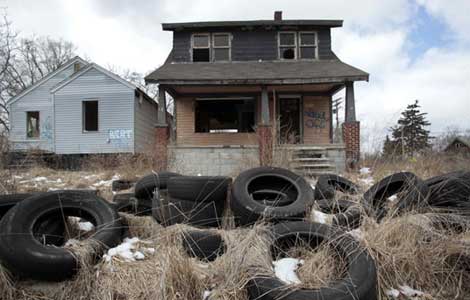
 Detroit files biggest ever US municipal bankruptcy
Detroit files biggest ever US municipal bankruptcy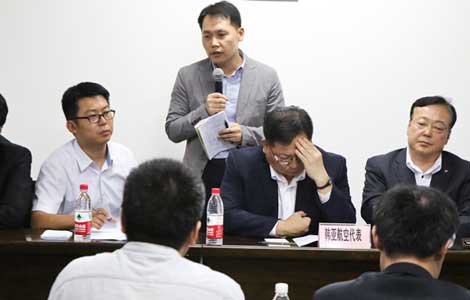
 Plane crash victims' parents seek answers
Plane crash victims' parents seek answers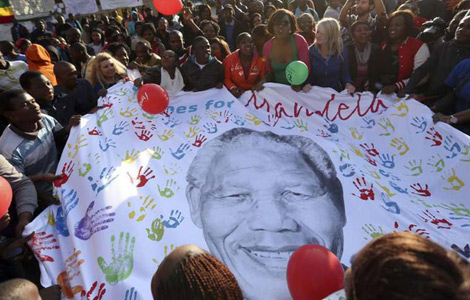
 'Improving' Mandela marks 95th birthday
'Improving' Mandela marks 95th birthday
 Qingdao eatery finds use for pesky seaweed
Qingdao eatery finds use for pesky seaweed
 From university campus to boot camp
From university campus to boot camp
 FIFA head: World Cup in Brazil could be mistake
FIFA head: World Cup in Brazil could be mistake
Most Viewed
Editor's Picks

|

|

|

|

|

|
Today's Top News
Monetary system needs overhaul, says report
US companies seek tougher enforcement of IP laws
Syrian refugees demand help from Kerry at camp
Second iPhone shock leaves man in coma
China's government spends less in 2012
Pregnant Olympic runner dies, baby saved
Detroit files biggest ever US municipal bankruptcy
Obama weighs canceling Moscow talks with Putin
US Weekly

|

|






